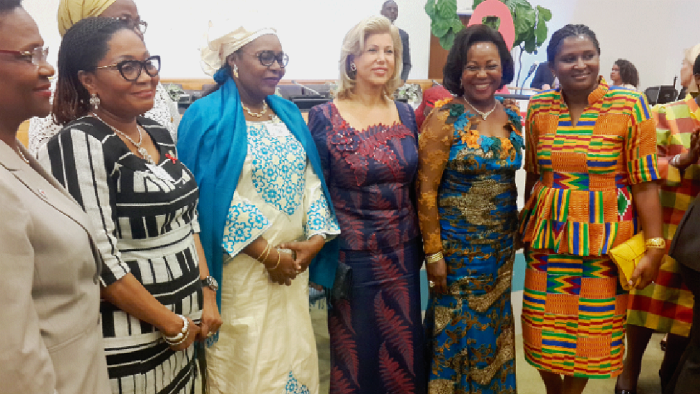
OAFLA advocates measures to improve adolescent well-being
The Organisation of African First Ladies against HIV/AIDS (OAFLA) has called for the stronger integration of health services and programmes to improve the general well-being of adolescent girls and young women.
Specifically, members of the group said the integration should support the ability of adolescent girls and young women to make informed choices and keep themselves healthy, particularly to protect themselves from HIV infection.
They made the call at a side event organised by OAFLA in collaboration with UNAIDS, Gavi, the Vaccine Alliance and the United States President’s Emergency Plan for AIDS Relief, at the United Nations General Assembly High-Level Meeting on Ending AIDS, which took place in New York, USA.
OAFLA session
The event, which had the theme: “Breaking the Silos: Empowering Adolescent Girls and Young Women to Access Integrated Services,” was aimed at empowering adolescent girls and young women to access integrated healthcare services.
The OAFLA session also showcased examples of adolescent-centred policies and programmes delivered by government, the private sector and international donors.
Concerns
The first ladies said AIDS-related illnesses were estimated to be the leading cause of death among adolescents in sub-Saharan Africa, while gender-based violence, gender inequity, harmful gender norms, stigma and discrimination often prevented women and girls from knowing their HIV status and accessing appropriate prevention and treatment services.
They also pointed out that adolescent girls were disproportionately challenged by poverty and lack of access to education, early and forced marriage and other socio-economic and cultural factors.
They, therefore, drew attention to the need for adolescent girls to assume leadership roles, to ensure the development of programmes and policies that were appropriate to their needs.
They were joined by the first ladies of Haiti and Panama.
Suggested measures
The President of OAFLA and First Lady of Ghana, Mrs Lordina Mahama, who gave the keynote address, harped on the need for the challenges of young people, especially young girls, to be addressed by ending gender inequality and other factors that increased their vulnerability to HIV.
For his part, the Chief Executive Officer of Gavi, Seth Berkley, noted that the current generation of the youth was the biggest in history and advised that, “If we want a demographic dividend from that generation, we have to invest in adolescents now.”
The First Lady of Panama, Mrs Lorena Castillo de Varela, said information allowed young people to make informed choices that empowered them. She, therefore, encouraged all stakeholders to come up with programmes that would really work for young women.
The First Lady of Côte d’Ivoire, Mrs Dominique Ouattara, underscored the need for increased efforts towards the provision of antiretroviral therapy, to protect the future of countries, stressing, “The young people are the future.”
The First Lady of Burkina Faso, Mrs Adjoavi Sika Kabore, among others, called for new strategies to stop violence against women and girls, reduce school dropouts and end forced early marriage.
“We have to offer communities a package of integrated approaches that include immunisation, sexual and reproductive health and rights, and education,” Antoinette Sassou-Nguesso, the First Lady of the Congo, said.
The First Lady of Namibia, Mrs Monica Geingos, who also concentrated on the prevention of new HIV infections among young women, called for sexual education in the school curricula.”
“It is extremely important to meet the reproductive health needs of young Africans in order to end the HIV epidemic within the framework of the Sustainable Development Goals,” Mrs Aissata Issoufou Mahamadou, the First Lady of Niger, said.
A youth advocate who represented adolescents living with HIV, Thandiwe Mudhumo, encouraged all to speak out and stop all forms of abuse.
The Executive Director of UNAIDS, Michel Sedibe, cautioned that if the world continued to fail adolescent girls and young women, “we will not end the AIDS epidemic”.
